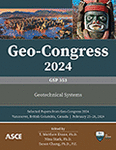Improving Student Engagement, Achievement, and Motivation Using Game Design-Based Learning in Undergraduate Geotechnical Engineering Classes
Publication: Geo-Congress 2024
ABSTRACT
Teaching and learning have been substantially impacted by the COVID-19 global pandemic induced rapid shift to online and hybrid learning environments. Research has shown that this shift impacted student engagement, learning outcomes, teamwork/group dynamics, and the development of “soft” or professional skills. Although students and faculty have returned to in-person classes, teaching and learning has not returned to the pre-pandemic status quo. Thus, this study presents curricular methods developed and evaluated to enhance student engagement and learning. By providing students with more ownership of their learning and re-engaging them in the process, the students will find value in what they are learning and develop professional skills in their in-person interactions. In the new curriculum, students collaboratively developed their own games (board, dice, card, or computer) rooted in fundamental/technical concepts from the classroom. Over the course of the semester, they built a playable prototype of their game. At the end of the semester, the students were asked to provide a brief presentation of their game, relevant components, and relation to the fundamental geotechnical engineering concepts, and give an overview of the game play. Students then engaged in a friendly gaming session, playing all the games developed in the class. The results indicated that this approach intentionally allows students to explore their creativity while growing their technical competency and professional skills. In particular, (1) students took ownership of the learning process that stemmed from creating their own tools to engage others via future game plays; (2) the design and development process improved goal-setting skills among students; and (3) participation in group activities built leadership, teamwork, and communication skills.
Get full access to this chapter
View all available purchase options and get full access to this chapter.
REFERENCES
Aldrich, C. (2004). “Simulations and the Future of Learning: An Innovative (And Perhaps Revolutionary) Approach to E-learning.” Pfeiffer.
Almendingen, K., Sandsmark Morseth, M., Gjølstad, E., Brevik, A., and Tørris, C. (2021). “Student’s Experiences with Online Teaching following COVID-19 Lockdown: A Mixed Methods Explorative Study.” PLoS ONE, 16(8), e0250378.
Baytak, A., Land, S. M., and Smith, B. K. (2011). “Children as Educational Computer Game Designers: An Exploratory Study.” TOJET: The Turkish Online Journal of Educational Technology, 10(4).
Bodnar, C. A., Anastasio, D., Enszer, J. A., and Burkey, D. D. (2016). “Engineers at Play: Games as Teaching Tools for Undergraduate Engineering Students.” Journal of Engineering Education, 105(1), 147–200.
Boehm, B. (1986). “A Spiral Model of Software Development and Enhancement.” ACM SIGSOFT Software Engineering Notes. 11(4), 14–24.
Boehm, B. (1988). “A Spiral Model of Software Development and Enhancement.” IEEE Computer, 21(5), 61–72.
Charlier, N., and De Fraine, B. (2012). “Game-Based Learning in Teacher Education: A Strategy to Integrate Digital Games into Secondary Schools.” International Journal of Game-Based Learning (IJGBL), 2(2), 1–12.
Deshpande, A. A., and Huang, S. H. (2011). “Simulation Games in Engineering Education: A State-of-the-Art Review.” Computer Applications in Engineering Education, 19(3), 399–410.
Egenfeldt-Nielsen, S. (2007). Beyond Edutainment: The Educational Potential of Computer Games. Continuum Press.
Gee, J. P. (2003). What Video Games have to Teach Us about Learning and Literacy. Palgrave Macmillan.
Kamysbayeva, A., Koryakov, A., Garnova, N., Glushkov, S., and Klimenkova, S. (2021). “E-learning Challenge Studying the COVID-19 Pandemic.” International Journal of Educational Management, 35(7), 1492–1503.
ldrich, C. (2009). “The Complete Guide to Simulations and Serious Games: How the Most Valuable Content will be Created in the Age beyond Gutenberg to Google.” Pfeiffer.
Marinoni, G., van’t Land, H., and Jensen, T. (2020). “The Impact of COVID-19 on Higher Education Around the World.” International Association of Universities.
Marlow, C. M. (2012). “Making Games for Environmental Design Education: Revealing Landscape Architecture.” International Journal of Gaming and Computer-Mediated Simulations (IJGCMS), 4(2), 60–83.
Nadolny, L., Alaswad, Z., Culver, D., and Wang, W. (2017). “Designing With Game-Based Learning: Game Mechanics From Middle School to Higher Education.” Simulation & Gaming, 48(6), 814–831.
NASEM (National Academies of Sciences, Engineering, and Medicine). (2016). Promising Practices for Strengthening the Regional STEM Workforce Development Ecosystem. The National Academies Press.
Pretelín-Ricárdez, A., and Sacristán, A. I. (2015). “Videogame Construction by Engineering Students for Understanding Modelling Processes: The Case of Simulating Water Behaviour.” Informatics in Education - An International Journal, 14(2): 265–277.
Ramsey, F. L., and Schafer, D. W. (2013). The statistical sleuth: A course in methods of data analysis. (3rd ed.). Australia ; Boston : Brooks/Cole, Cengage Learning.
Ryan, R. M. (1982). “Control and Information in the Intrapersonal Sphere: An Extension of Cognitive Evaluation Theory.” Journal of Personality and Social Psychology, 43(3), 450.
Stevens, M. J., and Campion, M. A. (1994). “The Knowledge, Skill, and Ability Requirements for Teamwork: Implications for Human Resource Management.” Journal of Management, 20(2), 503–530.
VanKrevelen, S. R. (2020). The Team KSA Test: Development and Validation. Doctoral Dissertation. Kansas State University.
Williams, G. C., and Deci, E. L. (1996). “Internalization of Biopsychosocial Values by Medical Students: A Test of Self-determination Theory.” Journal of Personality and Social Psychology, 70(4), 767.
Williams, T. (2022). “Class Attendance Plummets Post-COVID. The Times Higher Education, June, 9, 2022.
Wu, F., and Teets, T. S. (2021). “Effects of the COVID-19 Pandemic on Student Engagement in a General Chemistry Course,” Journal of Chemical Education, 98(12), 3633–3642.
Zamborová, K., Stefanutti, I., and Klimová, B. (2021). “CercleS Survey: Impact of the COVID-19 Pandemic on Foreign Language Teaching in Higher Education” CercleS 2021, 11(2), 269–283.
Information & Authors
Information
Published In
History
Published online: Feb 22, 2024
ASCE Technical Topics:
Authors
Metrics & Citations
Metrics
Citations
Download citation
If you have the appropriate software installed, you can download article citation data to the citation manager of your choice. Simply select your manager software from the list below and click Download.
